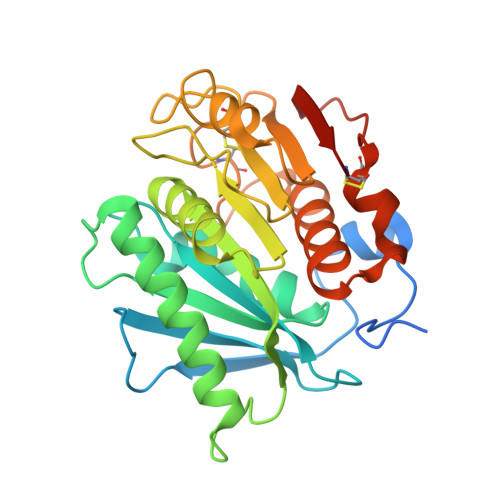Machine learning-aided engineering of hydrolases for PET depolymerization.
Lu, H., Diaz, D.J., Czarnecki, N.J., Zhu, C., Kim, W., Shroff, R., Acosta, D.J., Alexander, B.R., Cole, H.O., Zhang, Y., Lynd, N.A., Ellington, A.D., Alper, H.S.(2022) Nature 604: 662-667
- PubMed: 35478237
- DOI: https://doi.org/10.1038/s41586-022-04599-z
- Primary Citation of Related Structures:
7SH6 - PubMed Abstract:
Plastic waste poses an ecological challenge 1-3 and enzymatic degradation offers one, potentially green and scalable, route for polyesters waste recycling 4 . Poly(ethylene terephthalate) (PET) accounts for 12% of global solid waste 5 , and a circular carbon economy for PET is theoretically attainable through rapid enzymatic depolymerization followed by repolymerization or conversion/valorization into other products 6-10 . Application of PET hydrolases, however, has been hampered by their lack of robustness to pH and temperature ranges, slow reaction rates and inability to directly use untreated postconsumer plastics 11 . Here, we use a structure-based, machine learning algorithm to engineer a robust and active PET hydrolase. Our mutant and scaffold combination (FAST-PETase: functional, active, stable and tolerant PETase) contains five mutations compared to wild-type PETase (N233K/R224Q/S121E from prediction and D186H/R280A from scaffold) and shows superior PET-hydrolytic activity relative to both wild-type and engineered alternatives 12 between 30 and 50?ˇăC and a range of pH levels. We demonstrate that untreated, postconsumer-PET from 51 different thermoformed products can all be almost completely degraded by FAST-PETase in 1?week. FAST-PETase can also depolymerize untreated, amorphous portions of a commercial water bottle and an entire thermally pretreated water bottle at 50??C. Finally, we demonstrate a closed-loop PET recycling process by using FAST-PETase and resynthesizing PET from the recovered monomers. Collectively, our results demonstrate a viable route for enzymatic plastic recycling at the industrial scale.
Organizational Affiliation:
McKetta Department of Chemical Engineering, The University of Texas at Austin, Austin, TX, USA.















